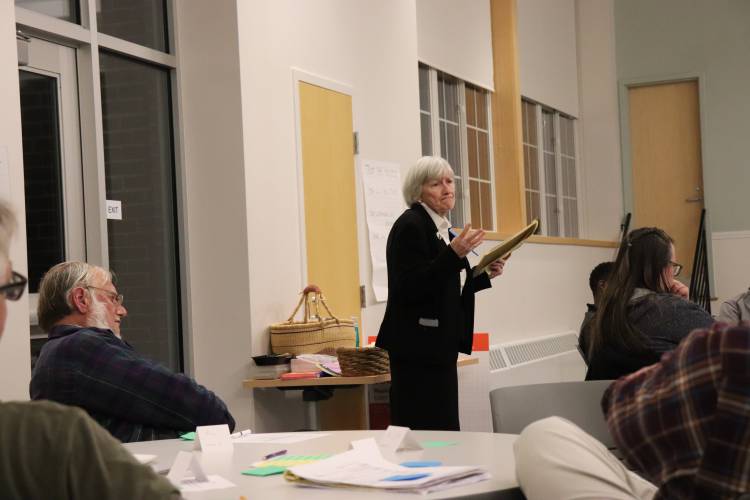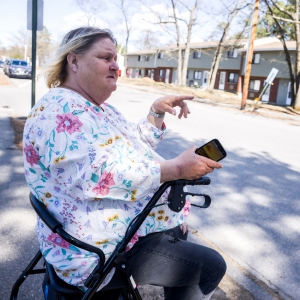Concord superintendent joins over 100 school leaders in signing controversial DEI certification, but says equity work will continue

Concord superintendent Kathleen Murphy speaks to a group of about 35 attendees at a forum about the future of the Rundlett Middle School building project on Nov. 16, 2022. Eileen O'Grady
| Published: 04-15-2025 6:28 PM |
Kathleen Murphy, the superintendent of the Concord School District, faced a choice.
She could sign a document required by the Trump administration and the state’s Department of Education certifying that Concord’s schools do not engage in purportedly illegal diversity, equity, and inclusion initiatives, or she could refuse and wait to see how the certification mandate played out in federal court.
Late Friday, she decided to sign, joining at least 100 other superintendents in the state so far.
Murphy said in an interview that the requirement and the Trump administration’s broader attacks on DEI will have no effect on ongoing diversity and equity work in Concord, which is one of four districts in the state that – until earlier this school year – employed a DEIJ director.
“We’re always trying to improve what we do and make sure that youngsters have an opportunity,” said Murphy, who stressed that none of the district’s initiatives violate anti-discrimination laws. “We want to continue that work. We don’t want to focus our work on arguing about documents.”
Murphy’s decision about how to proceed comes as local school district officials are increasingly caught in the middle of Trump administration policies. In February, for example, districts navigated conflicting guidance in the wake of an executive order banning transgender girls from participating on girls’ sports teams.
Now, New Hampshire has taken center stage nationally in the debate over how to proceed on the DEI certification requirement, which the federal Department of Education instituted on April 3. The notification directs schools to confirm that they don’t engage in “illegal DEI practices” and threatens to withdraw federal funding from districts that refuse to comply.
Last week, lawyers for the National Educators Association, the largest teachers’ union in the country, sued in federal court in New Hampshire to block the requirement, arguing that it could have a chilling effect on schools. Days later, they reached a temporary nationwide agreement with lawyers for the federal Department of Education that prevented enforcement on the basis of responses to the certification form. On Friday, the ACLU, which is representing the teachers’ union, announced that five New Hampshire school districts – Dover, Hanover, Oyster River, Portsmouth, and Somersworth – would join the lawsuit challenging the requirement.
Article continues after...
Yesterday's Most Read Articles
 ‘Deep flavor’ – New restaurant in downtown Concord offers creative spin on comfort food and cocktails
‘Deep flavor’ – New restaurant in downtown Concord offers creative spin on comfort food and cocktails
 ‘Over-regulation is going to create sneakier kids’: Concord High students react to impending bell-to-bell phone ban
‘Over-regulation is going to create sneakier kids’: Concord High students react to impending bell-to-bell phone ban
 Royal Gardens tenants worried about where they will live after building renovations
Royal Gardens tenants worried about where they will live after building renovations
 Reclaiming Healy Park: A symbol of renewal and a reckoning with homelessness in Concord
Reclaiming Healy Park: A symbol of renewal and a reckoning with homelessness in Concord
 Concord receives federal funding to clean old stables, paving way for stagecoach museum
Concord receives federal funding to clean old stables, paving way for stagecoach museum
 Concord-area runners tackle Mt. Washington Road Race
Concord-area runners tackle Mt. Washington Road Race
Last week, Secretary of Education Linda McMahon singled out New Hampshire’s Department of Education with praise as a “model of transparency for other states,” linking to a department website that tracks which school districts have complied. Other states, including New York and Minnesota, have rebuffed the federal government’s requirement, stating that they would not force their school districts to sign the form.
As of Tuesday afternoon, Hill, Hopkinton, Kearsarge, Merrimack Valley, and Pittsfield had all complied, according to the website, while Allenstown, Bow, Deerfield, Dunbarton, Epsom, Franklin, Henniker, John Stark, Pembroke, Shaker Regional, and Weare had not. Superintendents for the noncompliant districts did not respond to requests for comment.
The state has asked the districts to submit the form by Thursday, though a federal court hearing scheduled for that day could lead to that deadline being altered.
Leaders in the school districts suing the federal government over the requirement – none of which are based in Merrimack County – have argued that the ban on DEI practices is overly vague.
“The U.S. Department of Education’s unclear ban on DEI undercuts our ability to adequately meet the needs of our students and overrides our communities’ decision to uphold these values in our public schools,” Jay Badams, the superintendent of the Hanover and Dresden School Districts, said in a statement. “Our Districts look forward to standing by those values in Court.”
Murphy acknowledged the directive could prompt confusion but she said she is meeting with staff in every Concord school to assuage concerns and answer questions “to relieve any of the anxiety that they might feel around these orders that would impact their instruction.”
“We’re talking about the impact, what the district has in place, and the core values that the district has,” Murphy said.
The district has also undertaken a review of its English and social studies curricula, Murphy said.
Concord’s diversity, equity, inclusion, and justice director position, which was created in 2022, has been vacant since last fall after the director transitioned to another role. The district is currently engaging in an “equity audit,” and Murphy said that if its findings ultimately suggest that the position be filled again, she would have no qualms about doing that.
“We don’t discriminate,” Murphy said. “We practice inclusion. We believe in equity for all students, … so I don’t see us as violating any of those things.”
Still, Murphy, who has spent some two decades as a superintendent across three New Hampshire school districts, said there’s no doubt her job has become increasingly politicized.
“These are trying times for us,” she said. “We came into the business [and] it was all around teaching and learning, but our business has become very political.”
Jeremy Margolis can be contacted at jmargolis@cmonitor.com.







 Photos: A Downtown ‘I Do’ at Market Days in Concord
Photos: A Downtown ‘I Do’ at Market Days in Concord Granite Geek: The circle of life is painful when watching the species-gets-killed part
Granite Geek: The circle of life is painful when watching the species-gets-killed part Concord’s two Rite Aid stores shutting soon
Concord’s two Rite Aid stores shutting soon
